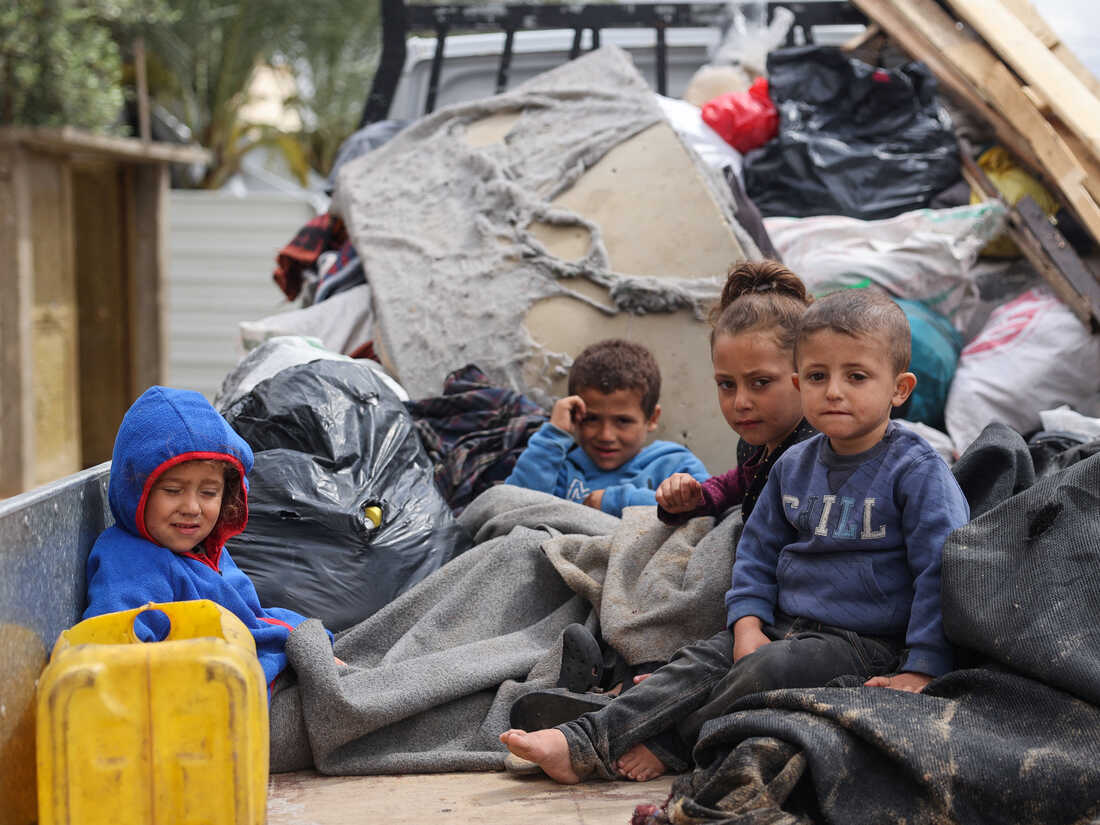Israeli army tells Palestinians to evacuate parts of Rafah
Displaced Palestinians in Rafah in the southern Gaza Strip pack their belongings following an evacuation order by the Israeli army on Monday amid the ongoing conflict between Israel and the Palestinian Hamas movement.
-/AFP via Getty Images
hide caption
toggle caption
-/AFP via Getty Images
Displaced Palestinians in Rafah in the southern Gaza Strip pack their belongings following an evacuation order by the Israeli army on Monday amid the ongoing conflict between Israel and the Palestinian Hamas movement.
-/AFP via Getty Images
TEL AVIV, Israel — The Israeli military on Monday ordered tens of thousands of displaced Palestinians in Rafah to evacuate, a move indicating Israel’s offensive on Gaza’s southmost area could be imminent.
People in Rafah were told to leave for an “expanded humanitarian area” in al-Mawasi and Khan Younis, areas north and northwest of the city. Israel’s military sent out text and voice messages, and posted maps on social media with arrows instructing people where to flee.
Israel’s move comes after the latest round of negotiations for a cease-fire and hostage deal between Israel and Hamas appeared to remain stuck on key issues of concern. CIA director, William Burns, reportedly took part in the Cairo talks over the weekend.
On Sunday, as a Hamas delegation was still in Egypt hammering out the deal being offered by Israel, Israel’s government announced the closure of the Qatar-based Al Jazeera news network in Israel. Israeli Prime Minister Benjamin Netanyahu also issued a statement saying it was Hamas that blocked a deal to release hostages, saying he gave Israel’s negotiating team a very broad mandate although no Israeli negotiators were sent to Cairo over the weekend.
“We are not ready to accept a situation in which the Hamas battalions come out of their bunkers, take control of Gaza again, rebuild their military infrastructure, and return to threatening the citizens of Israel,” he said, refusing a deal that demands Israeli troop withdrawal and an end to the war.
Meanwhile, senior Hamas leader Ismail Haniyeh said in a statement Sunday it was approaching the deal with “positive and flexible positions ” but that its priority is “to stop the aggression against our people.”
“What is the meaning of the agreement if a ceasefire is not its first outcome,” he said, indicating the talks continued to be stuck on key points regarding Israeli troop withdrawal from Gaza and whether a ceasefire and release of hostages would lead to a permanent ceasefire or a temporary truce.
Hours later, Hamas launched rockets from Rafah into Israel, killing four Israeli troops. Israel launched air strikes on Rafah, killing a number of civilians. Israel closed its border there with southern Gaza, where humanitarian aid had been entering.
Israel insists an assault on Rafah is necessary to dismantle Hamas battalions operating there. Netanyahu last week vowed to enter the southern Gaza area “with or without a deal” with Hamas.
Qatar, a key mediator, says a Rafah offensive could further complicate the negotiations while Egypt, which borders Rafah, has consistently opposed an assault on the city, fearing mass displacement of Palestinians into its territory.
The talks, however, remain stuck around key points regarding Israeli troop withdrawal from Gaza, the return of Palestinians to their cities in the north and whether a cease-fire and release of hostages would lead to a permanent cease-fire or a temporary truce.
Since late March, Israeli air strikes have hit Rafah almost daily, killing nearly 300 Palestinians, most of them women and children, according to hospital records and the Palestinian Center for Human Rights.
Briefing journalists on Monday, Israeli military spokesperson, Lt Col Nadav Shoshani, said Israel’s operation in Rafah would be of “limited scope”. But Shoshani would not say whether this meant a broader incursion had begun or would continue at a later stage.
Israel has carried out evacuations in the Gaza Strip by voice messages and leaflets throughout the war, but Palestinians say Israeli orders posted online or dropped in flyers are unclear, indicating numbered block zones with imprecise locations on a general map.
Many Palestinians in Rafah have told NPR over the past several weeks they cannot leave or do not know where to go. Others said they will follow wherever leaflets tell them to flee, even if areas in the past that were meant to be safe were later bombed.
Khan Younis has been mostly destroyed by Israel’s assault there and fighting with Hamas. There are also unexploded munitions in the area. Meanwhile, the region of al-Mawasi borders the sea and is lacking basic humanitarian services, including access to health care, water and fuel for generators or power.
For months, Israel has threatened to launch its ground offensive in Rafah, where almost half of Gaza’s 2.2 million population are sheltered. Prime Minister Benjamin Netanyahu says it is the only way to defeat Hamas. Israel believes at least four remaining Hamas battalions are still based in Rafah.
The U.S. and the U.N. have in the past weeks tried to discourage Israel from an incursion. Overnight, Israel’s Defense Minister, Yoav Gallant, told U.S. Secretary of Defense, Lloyd Austin, in a phone call that “there was no choice left and this meant the start of the Israeli operation in Rafah.”
